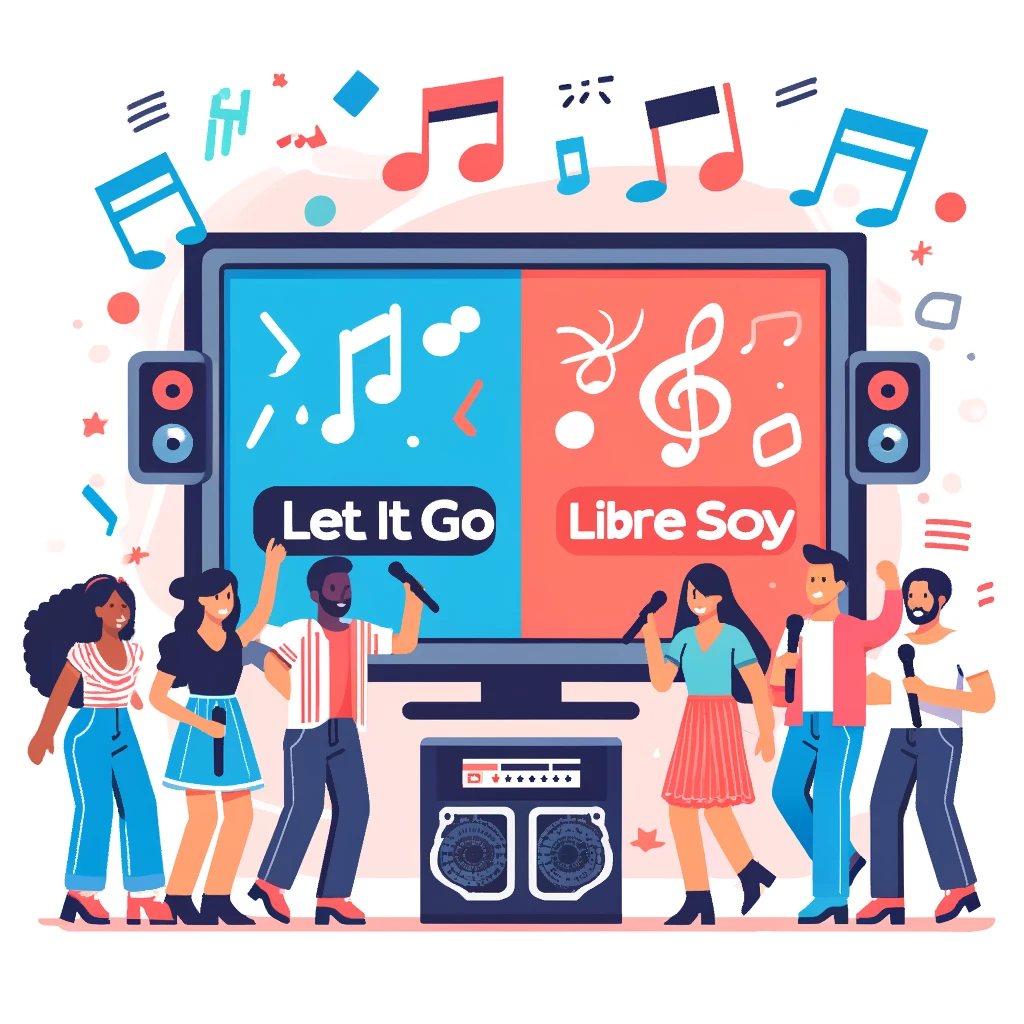Benefits of Bilingual Karaoke Sessions
Bilingual karaoke sessions can serve as an enriching experience that combines entertainment with educational benefits. The allure of music, combined with the fun of singing, makes karaoke an engaging way to immerse oneself in a new language and culture. Here’s a detailed look at the multifaceted benefits of bilingual karaoke sessions.

1. Language Learning: Karaoke sessions that include songs in two languages can enhance language acquisition. The lyrical content of songs provides context clues that help in understanding new vocabulary and phrases. Furthermore, the repetitive nature of songs assists in memorization and the improvement of pronunciation and intonation.
2. Cultural Exchange: Music is a reflection of culture. Engaging with songs in another language offers insights into the cultural nuances, idiomatic expressions, and themes that are important in the target culture. This can foster a deeper appreciation and understanding of the diversity in the world.
3. Cognitive Benefits: Learning a second language has been linked to various cognitive benefits, such as improved memory, better problem-solving skills, and increased mental flexibility. Bilingual karaoke challenges the brain by requiring the simultaneous processing of music and language, which can enhance these cognitive effects.
4. Social Interaction: Karaoke is inherently a social activity that can be enjoyed with friends or strangers alike. It encourages people to come together, regardless of their language background, promoting inclusivity and social bonding.
5. Confidence Building: For many, singing in front of others can be daunting. Doing so in a non-native language can be even more challenging. Bilingual karaoke provides a supportive environment where individuals can build confidence in their language skills and overcome the fear of making mistakes.
6. Entertainment Value: At its core, karaoke is about having fun. Bilingual sessions double the entertainment by offering a variety of songs in different languages, keeping the experience fresh and enjoyable.
7. Accessibility: With the advent of technology, karaoke tracks are widely accessible in numerous languages. This accessibility means that bilingual karaoke can be enjoyed anywhere—from a private home setting to a public karaoke bar.
8. Stress Relief: Singing is known to release endorphins, the body’s natural feel-good chemicals. The act of engaging in bilingual karaoke can thus serve as a form of stress relief, providing a joyful escape from daily pressures.
9. Improvement in Listening Skills: Listening to music in different languages can improve one’s ability to distinguish sounds and understand spoken language in a noisy environment—a skill that is particularly beneficial for language learners.
Bilingual karaoke sessions offer a multitude of benefits that go beyond mere entertainment. They serve as a bridge between languages, enhance cognitive abilities, foster social connections, and promote cultural understanding. Whether for educational purposes or just for fun, incorporating bilingual karaoke into one’s routine can be a delightful way to explore and enjoy the richness of multiple languages.
Songs to choose from
When selecting songs for a bilingual karaoke session, it’s a good idea to choose popular tunes that have versions in multiple languages. This not only helps participants enjoy the music but also makes the language learning aspect more accessible. Here’s a list of songs that are known to have versions in at least two different languages:
-
“Let It Go” from Frozen
- English: “Let It Go”
- Spanish: “Libre Soy”
-
“My Way” by Frank Sinatra
- English: “My Way”
- French: “Comme d’habitude”
-
“The Prayer” by Celine Dion and Andrea Bocelli
- English: “The Prayer”
- Italian: “La Preghiera”
-
“99 Red Balloons” by Nena
- English: “99 Red Balloons”
- German: “99 Luftballons”
-
“Hero” by Enrique Iglesias
- English: “Hero”
- Spanish: “Héroe”
-
“Mambo No. 5” by Lou Bega
- English: “Mambo No. 5”
- French: “Mambo No. 5”
-
“Dragostea Din Tei” by O-Zone
- Romanian: “Dragostea Din Tei”
- English: “Ma Ya Hi (Valentin Remix Radio Edit)”
-
“Un Anno D’Amore” by Mina
- Italian: “Un Anno D’Amore”
- Spanish: “Un Año de Amor”
-
“Color of the Wind” from Pocahontas
- English: “Colors of the Wind”
- Multiple languages for the international release
-
“Volare” by Domenico Modugno
- Italian: “Nel Blu Dipinto Di Blu (Volare)”
- Spanish: “Volare”
-
“I Want to Hold Your Hand” by The Beatles
- English: “I Want to Hold Your Hand”
- German: “Komm, gib mir deine Hand”
-
“La Vie en Rose” by Édith Piaf
- French: “La Vie en Rose”
- English: “La Vie en Rose”
-
“Quizás, Quizás, Quizás” by Osvaldo Farrés
- Spanish: “Quizás, Quizás, Quizás”
- English: “Perhaps, Perhaps, Perhaps”
-
“Besame Mucho” by Consuelo Velázquez
- Spanish: “Bésame Mucho”
- English: Various versions titled “Besame Mucho”
-
“Feliz Navidad” by José Feliciano
- Spanish: “Feliz Navidad”
- English: “Feliz Navidad”